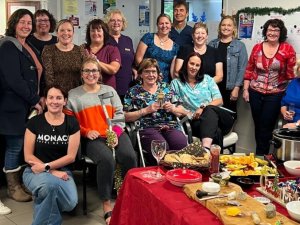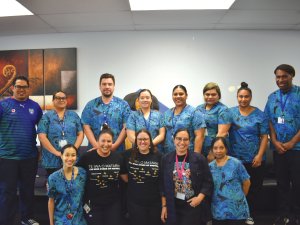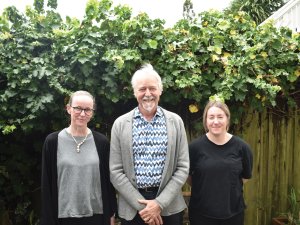Respiratory physician Lutz Beckert considers chronic obstructive pulmonary disease management, including the prevention of COPD, the importance of smoking cessation and pulmonary rehabilitation, and the lifesaving potential of addressing treatable traits. He also discusses the logic of inhaler therapy, moving from single therapy to dual and triple therapy when indicated, as well as other aspects of management
Teamwork and community spirit: Strong bonds define Karori Medical Centre in Wellington’s largest suburb
Teamwork and community spirit: Strong bonds define Karori Medical Centre in Wellington’s largest suburb

During the pandemic, Karori Medical Centre patients voluntarily took to the streets to assist with traffic management and distribute testing kits, exemplifying the kind of reciprocal support that benefits the practice and the community, reports Zahra Shahtahmasebi
"We look after our community, and they look after us,” says Karori Medical Centre co-director and specialist GP Andreea Mogos.
This mutual support was evident during the COVID-19 pandemic when patients pitched in unprompted to direct traffic around pop-up clinics and swabbing drive-throughs. They also dropped off kits to other people’s homes, says Dr Mogos.
The practice, established 47 years ago, is in a two-practice PHO, giving it greater autonomy than many practices have to cater to patients’ specific needs.
The purpose-built Parkvale Road centre was established in 1976 by four GPs, including former Pharmac medical director Peter Moodie. Co-director and specialist GP Jeff Lowe notes that the building layout, though 47 years old, still functions effectively, albeit with space limitations.
As the practice grows and the range of services offered expands, the practice is looking at how it could further develop the space and its workforce.
Dr Lowe says this involves relocating services typically offered in a hospital setting, such as treating skin lesions, administering infusions and conducting endoscopies, to the community. This shift aims to enhance accessibility to care for patients.
A second building sits behind the main clinic and is used to run extra services, such as respiratory clinics needed during the pandemic. A satellite clinic 500m away at 146 Karori Road provides a range of health services, including dentistry, podiatry, midwifery, physiotherapy and counselling.
Karori Medical Centre is owned by seven directors, all specialist GPs who work there.
It became its own Independent Practitioners Association (IPA) in 1993, then a single-practice PHO in 2002. That same year, it was the third practice in the country to become captitated, says Dr Lowe.
In 2011, after a national reduction in PHOs, it joined Hutt Valley’s Ropata Health to form Cosine Primary Care Network.
The PHO is governed by a trust representing the community, iwi and the providers, and supported by the management of both practices.
Dr Lowe, a former chair of General Practice NZ and now sitting on the board of Te Whatu Ora, says being a PHO is one of the centre’s distinguishing factors, allowing for more autonomy.
Co-director and specialist GP Ros Wall says that managing its own programmes enables the centre to address the specific needs of its population and provides a sense of agility.
This proved crucial during COVID-19, enabling the team to respond swiftly and bypass bureaucratic hurdles, Dr Wall says. “We took the opportunity to be involved in some of the first immunisation centres at the airport and down at the port.”
This provided the team with valuable insights on how to set up a local immunisation centre at a mall in collaboration with the DHB.
The practice operates from 8am to 6pm, Monday to Friday, and from 9am to 12pm on Saturday mornings, with two GPs available for acute appointments. On weekdays, a duty doctor and an acute doctor address acute demand, attending to walk-ins and patients triaged as urgent by the nurses.
After-hours services are provided through the virtual service Practice Plus, with referrals to Wellington After Hours Medical Centre for appointments if needed.
Karori’s geographical location, tucked among hills about 6km west of Wellington CBD, has proven advantageous, effectively confining the practice’s large population and enhancing service delivery, says Dr Wall.
“We know where everyone lives, and everyone knows each other.”
Cosine Primary Care Network serves a combined population of about 36,000 across Karori Medical Centre and Ropata Health.
The Karori centre has about 15,617 of these patients. Some 73 per cent are New Zealand European/Pākehā, 19 per cent are Asian, 5 per cent Māori and 3 per cent are Pacific. The practice’s size means it sees “a lot of everything”, says Dr Lowe.
There are a lot of older patients, families, diabetics and an increasing complexity of cases. “We don’t have the most demanding demographic. They’re highly educated, and that means they’re demanding in different ways, and I enjoy that challenge.”
Dr Wall and specialist GP colleague Richard Lynbrook provide healthcare at local resthome Metlifecare Karori Village. They also deliver services to young people with disabilities and complex conditions at St John of God Karori.
The centre was in the first wave of general practices that became a Health Care Home, accredited in 2016, making it an early adopter and advocate of using a patient portal, says Dr Lowe.
“We use the full suite of offerings, including open notes, and we feel that has helped our patients to become true participants in their care.”
Anecdotally, that is the case, with nearly 90 per cent of patients using the portal Manage My Health saying they feel far more involved in decisionmaking and generally more in control of their health.
The centre has provided telehealth services since it became a Health Care Home, says Dr Lowe.
However, COVID-19 accelerated adoption by the practice and increased patient acceptance. Phone consultations have been a game-changer for time-strapped patients.
Giving patients the choice between virtual or face-to-face consults is important, Dr Lowe adds.
Everyone has each other’s back at the centre, says general manager Fiona McConnon.
Just recently, the centre was short of nurses, and the GPs stepped in straight away to cover the gap.
“We’re here for the patients...Everyone helps each other so we can keep it all running,” Ms McConnon says.
Karori Medical Centre has 41 staff including 14 GPs, one first-year GP registrar, 10 practice nurses, a health care assistant, a health improvement practitioner, a practice assistant, a health coach and a mental health counsellor.
There is also an administration team of nine, a general manager and a finance manager.
Finding staff is always a challenge, says Dr Lowe. However, the practice’s size and profile make it easier to attract applicants. Finding nurses is one of the biggest issues, especially when competing with the better-paid contracts offered in secondary care, but the centre has just recently reached its full quota of 10.
With one GP having just left and another leaving at the end of the year, it is currently searching for another. There are enough staff to run services, but there is extra strain on the team.
The centre prioritises meeting acute demand and ensuring same-day access for patients in need, although this can sometimes lead to delayed routine care, notes Dr Lowe.
While the patient portal offers numerous benefits, it has notably elevated the non-clinical workload for GPs.
The practice is actively considering strategies to manage this effectively, Dr Lowe adds.
While some may view the health reforms as a challenge, he sees them as an opportunity to elevate the practice to a new level.
The team is closely monitoring the reforms to understand how localities may change and their potential implications for PHOs in the future.
The centre will remain driven by its strong sense of duty to its community, says Dr Mogos. “We’re here to look after people the best we can, and that means looking after each other as well. That was evident during COVID-19, where everyone was having a hard time and had to step up as far as they could and support each other.”
The practice heavily invests in training GP registrars, who typically transition to permanent staff unless they choose to work abroad, explains Dr Mogos. “There’s lots of autonomy to grow in this environment, and we want to offer that to new doctors so they can grow into the type of clinicians they want to be.”
About seven years ago, Dr Mogos started at the practice as a first-year GP registrar. She was taught by Dr Lowe, who has also been at Karori since he was a first-year – 34 years.
He remains inspired by the practice’s teamwork and collegiality, and its commitment to innovation and being an early adopter of new models of care.
“A number of moves we have made – like becoming an IPA – allowed a certain amount of autonomy to work in a way that benefits both the patients and the practice,” says Dr Lowe.
Dr Wall’s biggest drawcard is the practice’s “outstanding” collaboration and support.
“We have a policy here of second opinions, of open doors, discussing cases at peer review, which has been a really good backstop in my career. I don’t feel like I am a solo practitioner working within a larger practice.”
Ms McConnon, who has a clinical background in nursing and midwifery and clinical management experience in secondary care, says her first year at the general practice has been a real eye-opener. “I’ve only been in primary care for 12 months, and you think secondary care is glamorous, but primary care is the most important.
“There’s so much that can be done here that can be life-changing.”
Zahra Shahtahmasebi is an Auckland journalist
Locations: 11 Parkvale Road, Karori, Wellington, and a satellite clinic at 146 Karori Road
PHO: Cosine Primary Care Network
Owners: Seven directors who are all GPs
Staff: Forty-one – 15 doctors including one GP registrar, 10 nurses, one health care assistant, one health improvement practitioner, one practice assistant, one health coach, one mental health counsellor, nine administrators, a general manager and a finance manager
Enrolled patients: 15,617
Funding: Capitation
TELL US WHAT YOU THINK
Please add your comments using the comment function below and, remember, if in doubt, check out our comment policy.
We're publishing this article as a FREE READ so it is FREE to read and EASY to share more widely. Please support us and our journalism – subscribe here
One of the benefits of subscribing is you will also be able to share your thoughts about what you read with others in our Comment Stream. You can also take notes on what you read with Capture








![Barbara Fountain, editor of New Zealand Doctor Rata Aotearoa, and Paul Hutchison, GP and senior medical clinician at Tāmaki Health [Image: Simon Maude]](/sites/default/files/styles/thumbnail_cropped_100/public/2025-03/Barbara%20Fountain%2C%20editor%20of%20New%20Zealand%20Doctor%20Rata%20Aotearoa%2C%20and%20Paul%20Hutchison%2C%20GP%20and%20senior%20medical%20clinician%20at%20T%C4%81maki%20Health%20CR%20Simon%20Maude.jpg?itok=-HbQ1EYA)
![Lori Peters, NP and advanced health improvement practitioner at Mahitahi Hauora, and Jasper Nacilla, NP at The Terrace Medical Centre in Wellington [Image: Simon Maude]](/sites/default/files/styles/thumbnail_cropped_100/public/2025-03/2.%20Lori%20Peters%2C%20NP%20and%20advanced%20HIP%20at%20Mahitahi%20Hauora%2C%20and%20Jasper%20Nacilla%2C%20NP%20at%20The%20Terrace%20Medical%20Centre%20in%20Wellington%20CR%20Simon%20Maude.jpg?itok=sUfbsSF1)
![Ministry of Social Development health and disability coordinator Liz Williams, regional health advisors Mary Mojel and Larah Takarangi, and health and disability coordinators Rebecca Staunton and Myint Than Htut [Image: Simon Maude]](/sites/default/files/styles/thumbnail_cropped_100/public/2025-03/3.%20Ministry%20of%20Social%20Development%27s%20Liz%20Williams%2C%20Mary%20Mojel%2C%20Larah%20Takarangi%2C%20Rebecca%20Staunton%20and%20Myint%20Than%20Htut%20CR%20Simon%20Maude.jpg?itok=9ceOujzC)
![Locum GP Helen Fisher, with Te Kuiti Medical Centre NP Bridget Woodney [Image: Simon Maude]](/sites/default/files/styles/thumbnail_cropped_100/public/2025-03/4.%20Locum%20GP%20Helen%20Fisher%2C%20with%20Te%20Kuiti%20Medical%20Centre%20NP%20Bridget%20Woodney%20CR%20Simon%20Maude.jpg?itok=TJeODetm)
![Ruby Faulkner, GPEP2, with David Small, GPEP3 from The Doctors Greenmeadows in Napier [Image: Simon Maude]](/sites/default/files/styles/thumbnail_cropped_100/public/2025-03/5.%20Ruby%20Faulkner%2C%20GPEP2%2C%20with%20David%20Small%2C%20GPEP3%20from%20The%20Doctors%20Greenmeadows%20in%20Napier%20CR%20Simon%20Maude.jpg?itok=B0u4wsIs)
![Rochelle Langton and Libby Thomas, marketing advisors at the Medical Protection Society [Image: Simon Maude]](/sites/default/files/styles/thumbnail_cropped_100/public/2025-03/6.%20Rochelle%20Langton%20and%20Libby%20Thomas%2C%20marketing%20advisors%20at%20the%20Medical%20Protection%20Society%20CR%20Simon%20Maude.jpg?itok=r52_Cf74)
![Specialist GP Lucy Gibberd, medical advisor at MPS, and Zara Bolam, urgent-care specialist at The Nest Health Centre in Inglewood [Image: Simon Maude]](/sites/default/files/styles/thumbnail_cropped_100/public/2025-03/7.%20Specialist%20GP%20Lucy%20Gibberd%2C%20medical%20advisor%20at%20MPS%2C%20and%20Zara%20Bolam%2C%20urgent-care%20specialist%20at%20The%20Nest%20Health%20Centre%20in%20Inglewood%20CR%20Simon%20Maude.jpg?itok=z8eVoBU3)
![Olivia Blackmore and Trudee Sharp, NPs at Gore Health Centre, and Gaylene Hastie, NP at Queenstown Medical Centre [Image: Simon Maude]](/sites/default/files/styles/thumbnail_cropped_100/public/2025-03/8.%20Olivia%20Blackmore%20and%20Trudee%20Sharp%2C%20NPs%20at%20Gore%20Health%20Centre%2C%20and%20Gaylene%20Hastie%2C%20NP%20at%20Queenstown%20Medical%20Centre%20CR%20Simon%20Maude.jpg?itok=Z6u9d0XH)
![Mary Toloa, specialist GP at Porirua and Union Community Health Service in Wellington, Mara Coler, clinical pharmacist at Tū Ora Compass Health, and Bhavna Mistry, specialist GP at Porirua and Union Community Health Service [Image: Simon Maude]](/sites/default/files/styles/thumbnail_cropped_100/public/2025-03/9.%20Mary%20Toloa%2C%20Porirua%20and%20Union%20Community%20Health%20Service%20in%20Wellington%2C%20Mara%20Coler%2C%20T%C5%AB%20Ora%20Compass%20Health%2C%20and%20Bhavna%20Mistry%2C%20PUCHS%20CR%20Simon%20Maude.jpg?itok=kpChr0cc)